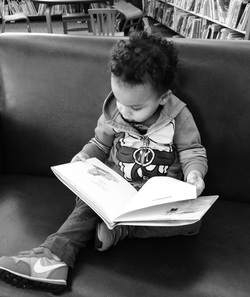As you can see from Anna's post there are many benefits to reading nursery rhymes to your child. I want to elaborate on one particular benefit which is number 6 on Anna's list: Listening to Nursery Rhymes builds vocabulary.
In a previous post, I discussed the different tiers of vocabulary. Three Tiers of Vocabulary Educator and author of Bringing Words to Life, Isabel Beck, has categorized all words into three tiers. Tier I -Most basic words -Rarely require instruction in school -Examples: clock, baby, happy Tier II -Words that are high frequency for mature language users and are found across a variety of domains -Not so common in everyday language -Instruction adds productivity to an individual’s ability -Examples: coincidence, absurd, industrious Tier III -Words whose frequency of use is quite low and is often limited to specific domains -Best learned when needed in a content area -Examples: isotope, lathe, peninsula Therefore, when teaching vocabulary, it makes the most sense to teach Tier II words. I want to illustrate just how many tier II words your child can easily hear and learn just by repeating and reading nursery rhymes. Below are common nursery rhymes in which I've highlighted the tier II vocabulary. Hickory Dickory Dock, the mouse ran up the clock. The clock struck one, the mouse ran down, Hickory dickory dock! Jack and Jill went up a hill to fetch a pail of water. Jack fell down and broke his crown and Jill came tumbling after. Little Miss Muffet, sat on a tuffet, eating her curds and whey. Along came a spider, who sat down beside her and frightened Miss Muffet away. Pussycat, pussycat, where have you been? I've been to London to visit the Queen. Pussycat, pussy, what did you do there? I frightened a little mouse under the chair. Twinkle, twinkle little star, how I wonder what you are. Up above the world so high. Like a Diamond in the sky. Twinkle twinkle little star, how I wonder what you are. Jack be nimble, Jack be quick, Jack jump over the candlestick. As you can see, there are tons of vocabulary words that your children can be exposed to. You might be wondering why I only highlighted some words but not others. It's important to keep in mind that tier II words are ones that are not specific to a content area and are seen frequently in books and literature. There are different levels of tier II words as well ranging from very frequent to less frequent. I'm sure many can be argued that some may be specific to a content area or some may be too simplistic. For example, the word "quick" may be considered a tier I word. However, I imagine that parents might use the word "fast" before they say "quick." When using vocabulary with your child, start using synonyms when you are describing something. "Wow you ran very fast. You are very quick!" You can also see how a lot of the language used above may spark conversations with your child beyond the tier II vocabulary. For example: Where is London? What are curds and whey? Also Twinkle Twinkle little star contains a simile: like a diamond in the sky. The other thing to keep in mind, is that if your child has background knowledge of nursery rhymes (and fairy tales) it will help them tremendously when they get into school. Often nursery rhymes and fairy tales will be referred to in other stories or on tests. Or they may have to compare and contrast an original with a twisted or fractured version. And not knowing the original versions puts kids at a huge disadvantage. Nursery rhymes may seem small and simplistic, but the benefits they offer to your child's education are endless. 3/28/2016 11:13:03 am
Great job identifying tiered words in nursery rhymes. This is also the exact reason why kids need picture books for a much longer period than usually given before they jump into easy chapter books.
Mandy
3/28/2016 06:36:23 pm
Thank Julianna. Comments are closed.
|
We are so excited to be mixing things up at CBA, beginning with some delicious additions to the Blogfish. Meet our awesome bloggers!!
Here's our lineup: 1st Mondays begin with former school psychologist Dr. Debra Collins who will be writing about Social emotional Learning in kidlit and behind the scenes as well as Jewish children's books. 2nd Mondays will feature super smart Melissa Stoller whose career is taking off with several new books. 3rd Mondays will feature our new blogger coming soon. 4th Mondays features new blogger, the fabulous Brentom Jackson, who has a beautiful approach to blogging. And 5th Mondays we'll be taking a break Archives
July 2024
|
|
Discover
|
About Us
|
Join Us
Join our Community and receive a fabulous free gift, KidLit tips, newsletters, scholarship info, contests, and more!
Join our KidLit Mentorship |
Social Media
Interact with our FaceBook Group or follow us on:
|
© 2010-2024 All content on this website is copyrighted. Sorry, all courses are non-refundable.

 RSS Feed
RSS Feed
